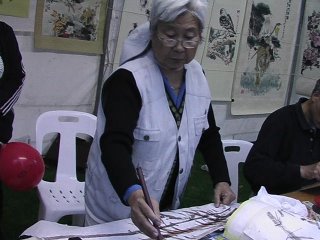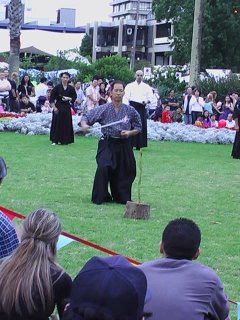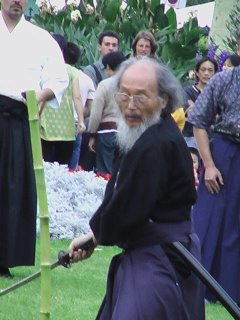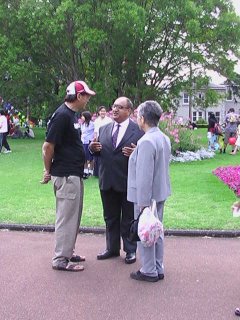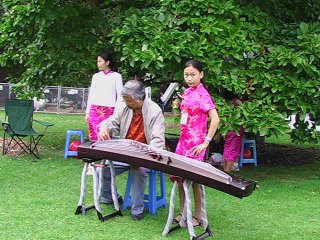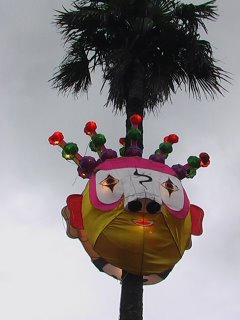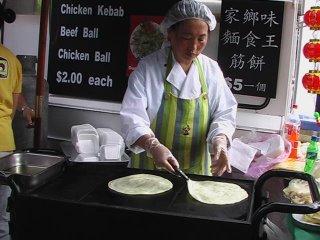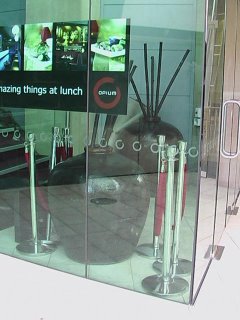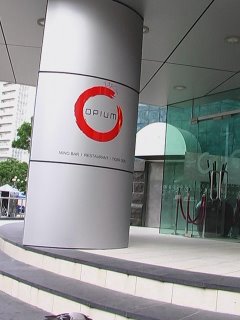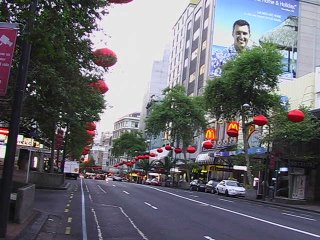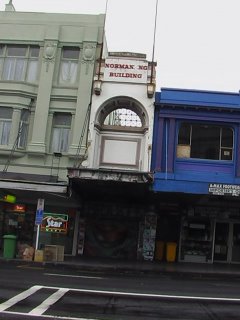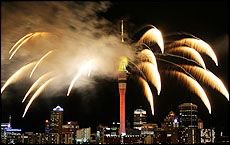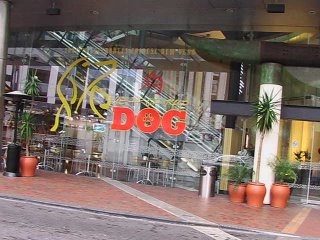Tuesday, February 28, 2006
Steven Young Thesis
October 2005
FROM ASSIMILATION TO MULTICULTURALISMEvidence of an evolving model of settlement for the Chinese community in New Zealand from 1950 to the present.
1. INTRODUCTION
In the literature review undertaken as the first part of this exercise I reviewed the early history of the Chinese in New Zealand which included their first arrival as sojourner gold miners, their later move to urban centres and official discouragement of further migration and racial discrimination in the form of the Poll Tax and restrictions on the migration of women. I noted that at the beginning of the Second World War the Government allowed only the temporary entry of a group of Chinese women and children as a humanitarian measure, but at war’s end the Government relented and allowed them to stay and also allowed further family reunification - but not migration of unrelated persons. As a result more children were born, but because of cultural isolation, (arising from generally uneducated parents and the Communist takeover of China) these all grew up adopting the English language and local culture and lost contact with their Chinese heritage. I concluded that it also appeared to be official policy to encourage assimilation of the Chinese into the host culture in the hope that within a generation or two the Chinese would be fully merged through free inter-marriage and the “problem” of their existence as a separate racial group would largely disappear.
Friday, February 24, 2006
Bill Tung - Passed Away
February 8, 2006 l Filed Celebrities' News, Hong Kong Celebrities
Hong Kong famous horse-racing commentator Bill Tung (董驃) is figthing his illness, he has been troubled by illness since last September. Best wishes and get well soon Uncle Bill.
Bill Tung or Tung Biu, often regarded as Uncle Bill is the most popular horse-racing commentator and show host in Hong Kong. His humor and bold critics on his show has managed to attract lots of fans, some of his audience don’t even race horses.
Bill Tung was acting in some movies as well, including the popular “It’s a Mad, Mad, Mad World” (富貴迫人)with Lydia Sum (沈殿霞) in 1980s. Internationally he is probably well known as Inspector Bill Wong as Jacky Chan’s superior in movie “Police Story” and also co-starring Jacky Chan in a few other earlier movies.
For the past few years Bill Tung has spent most of his time in Macau as a show host and horse trainer and managed to become a championship horse trainer.
Get well soon Uncle Bill!
UPDATE!Bill Tung passed away on Feb-22, 2006 at age of 73. RIP Uncle Bill.
Saturday, February 11, 2006
I Want My Job Back
Auckland heart surgeon Xiao-Zhong Chen will be forced to return to China if he is refused his job back, a situation described by one former colleague as a "tragedy and a great loss to New Zealand medicine". At an emotional party last night to celebrate his acquittal on all charges of supplying a decongestant for the manufacture of methamphetamine, or P, Dr Chen said: "I love my job, and I just want it back." While working in Auckland, Dr Chen performed 1200 heart operations and 300 lung operations, a number described as astonishing by colleagues. But he has been without income since December 2004 and has no guarantee of getting his job back. "That is the next war," said former colleague Alan Kerr. Dr Chen said last night that he would seek urgent talks with the Auckland District Health Board to see if his future lay in NZ. If not, he would have to look to a move to Shanghai. The heart surgeon's family cried tears of elation as eight not guilty verdicts were read out in the Auckland District Court. A jury of seven women and four men took 25 minutes to acquit Dr Chen of all charges of supplying Telfast for the manufacture of P. "We're just relieved, very happy that we can go back to being normal. That's the biggest thing. Normality would be very very nice," said Dr Chen's daughter, Nancy, who flew from Sydney to be by her father's side throughout the two-week trial. She was still frustrated at how police handled the matter. "If they had gone to the trouble in the first place, we wouldn't have had to go through these 1 years. "We know the stupid things he does, but it's hard for other people to understand how somebody could be so naive ... He's got no idea who Brad Pitt and Angelina Jolie are." She is angry the two young Chinese nationals who duped her father into supplying them with the decongestant were allowed to skip the country within 24 hours of being granted bail. Throughout the trial, Dr Chen's consistent testimony cast doubt on the prosecution's case that he knowingly supplied the decongestant tablets for a $250,000 gain. Dr Chen, 54, maintained that he thought the tablets were being shipped to a pharmaceutical company for sale in China. He believed the tablets - which are not available in China - would help people there. He said he did not know about Telfast's use in manufacturing P until he saw a January 2004 TV news item. Character testimony from colleagues and family portrayed him as honest but naive and unworldly - due to the amount of time he spent working. His wife, Wendy Tang, testified that her husband was so dedicated to work, he took textbooks on their honeymoon. The court also heard how work - not money - was what made him happy. Before the jurors retired to consider their verdict, Judge Fred McElrea told them they must be convinced beyond a reasonable doubt that the surgeon knew the tablets were being used to make P. Dr Chen now hopes the Medical Council will reinstate his licence, which was suspended when the charges were laid. At the time, he was working as a cardio-thoracic surgeon at Green Lane Hospital. He had been on a short-term contract and was on the verge of full-time employment with specialist registration. Dr Chen had the opportunity to sign a contract while his name and details of the case were suppressed by the court. It would have meant he would have been suspended on full pay. But he told management what was happening and has been out of work since. Not being able to work has been difficult. "I want to work," he said. "I enjoy every day, weekend and night, working in the hospital." Dr Kerr said Dr Chen was "a truly first-class surgeon". "If he isn't re-employed, it would be a big loss to New Zealand medicine."
Author
•
More by Errol Kiong
•
Email Errol Kiong
•
More by Stuart Dye
•
Email Stuart Dye
Thursday, February 09, 2006
Graveyard repair major recipient of trust cash
09.02.06By Julie Middleton
The largest grant from the new $5 million Chinese Poll Tax Heritage Trust has gone towards restoration of desecrated Chinese graves, some dating from the early 1900s, in a South Island cemetery. A total of $25,000 has been awarded to the Historic Cemeteries Conservation Trust for professional repair of headstones in the 114-grave Chinese section of the Southern Cemetery in Dunedin, one of the city's earliest. Trust chairman Stewart Harvey said cemeteries recorded important New Zealand history - but some local authorities seemed uninterested in maintaining them. The Chinese section of Southern was in poor repair, and as many headstones were small - around 45cm high - they were easily damaged and lost. Volunteers had cleared weeds and debris, and thanks to a 1982 genealogist's log of the headstones, the trust - whose members include academics and historians - knew where everything belonged and would ensure it was restored. Poll tax trust chairman James Ng, a retired medical doctor and historian, said many Chinese had a "special affinity" with ancestral graves. They believe that a deceased person had several souls, one of which remained at the gravesite. The trust was set up with $5 million of Government money last year. It followed the Government's formal apology, at Chinese New Year in 2002, to descendants of Cantonese settlers who were singled out for a poll tax of £100 (in today's money, $15,226) for entering the country, and other punitive laws. The trust's aim is to assist with initiatives which help to strengthen the identity of Chinese Kiwis and to enhance understanding of their place in New Zealand history. Part-time Cantonese language schools have done well out of this first round, with grants to the Auckland Chinese Community Centre ($6000), the Christchurch Chinese Church ($1500), the same city's Rewi Alley School ($1500) and Auckland's Chinese New Settlers Trust ($2500). Several grants have gone towards oral histories: $5000 to Liu Sheung Wong to interview Chinese fruiterers, and $8000 to Eva Wong Ng to employ transcription help with the histories she has been collating over the past decade.
Author
•
More by Julie Middleton
•
Email Julie Middleton
Links
•
Cemeteries
•
Department of Internal Affairs
http://www.nzherald.co.nz/search/story.cfm?storyid=000E0EAA-8DD2-13E9-87E183027AF10190
Monday, February 06, 2006
Banana Confessions
Auckland filmmaker Roseanne Liang’s Banana In A Nutshell might not stand out on the first read-through of this year’s film festival programme. Nestled away on page 50, it’d be easy to overlook altogether, in which case you’d be missing out – it promises to be one of the more interesting documentaries on offer, coming straight from a number of sold out and extremely well-received screenings in Auckland and Wellington.
If Liang says she never expected such a positive reaction, it’s not just modesty – it wasn’t until most of the footage had been shot that the thought of publicly releasing the film even occurred. “I’ve been collecting pieces of my life on video for a while now, ever since I found out the camera is the greatest confessional device for getting things off your chest”, she explains. “The thing is, I never expected this film to really make it big in a public way, so I made it firstly for myself, just to remember what happened”.
What did happen goes something like this: for the last eight years, the New Zealand-born Liang has been navigating the cultural minefield between her kiwi boyfriend and her strictly traditional Chinese parents. At 27, Liang must remain living at home with them until she is married, and after eight years, they still live in denial of her relationship. If pursuing a career in the unorthodox field of filmmaking was embarrassing for the Liangs, then the very thought of their daughter marrying a New Zealander is mortifying – yet that is exactly what she is determined to do. The film, then, chronicles the weeks of uncertainty, nerves and tension leading up to the big day, when her partner Stephen must approach her father to formally request permission to marry. In Mandarin.
As writer Tze Ming Mok – also a first generation Chinese New Zealander – points out in her review of the film, this scenario has become relatively uncommon. “Roseanne … seems to be living my mother’s life”, she writes. “The parental Liangs are a throwback to the previous generation, and their attitudes will probably be seen as extreme and retrograde by the Chinese people who see this film”. But, as Liang recently found out, the theme is echoed in relationships the world over. “We had Q&A sessions at the end of the Auckland screenings and the most heartwarming thing was people, couples, members of every cultural community coming up to me and saying … how they had gone through similar difficulties with their partners, husbands and wives, from 50 years ago to the present day”.
For Liang, who has made a number of successful fictional short films, the 55-minute documentary was initially intended to be a lot shorter. “I originally envisaged a 15-minute piece, hence the ‘in a nutshell’ part of the title”, she explains, “but of course when I actually collected all the footage, it turned out there was a lot more engaging stuff than I thought there would be. Basically, when about 80% of the footage was collected, I realised I had a much longer beast on my hands, so I guess the piece came together, really, in the edit suite. I just cut intuitively; I wasn’t entirely sure how it would all turn out”. The director seems more surprised than anyone at how well it did turn out: “I really was just making the film for myself, and the apparent wider appeal of the film continues to amaze and delight me – it really is part of the magic of film, and I’m tremendously grateful that it’s happened!”
“Being so open and honest on the big screen in front of a packed house does foster huge anxieties”, Liang admits, “but the audience reaction to such an intimate look into my life has been nothing but positive so far. What’s most amazing for me is the way the film lets people open up about their lives to me, which I really love. I mean, how are we going to deal with this very common problem if we aren’t going to open up and talk about it? I like to think my film is fostering a spirit of discussion and path to understanding”.
Which begs the question – have her parents seen it yet? “I’m not sure,” Liang replies. “I have given them a copy to see, but I’m not sure if they have actually watched it. They haven’t really talked to me about it yet, but I think they are as surprised as I am about the amazing reaction”.
By Calum Henderson
Banana in a Nutshell screens at Rialto 3.15pm on Saturday 6 August & 12.00pm on Sunday 7 August.
Reviewed Joe Sheppard
REVIEWED BY JOE SHEPPARD
Banana in a NutshellDirected by Roseanne LiangFilm Festival; watch out for further release dates coming soonReviewed by Joe SheppardDespite what the title may suggest, Roseanne Liang’s Banana in a Nutshell is not a culinary-themed skin flick, nor does it have anything in common with Mamoru Oshii’s Ghost in the Shell series. BiaN is a welcome contribution to that good old New Zealand theme of identity – both personal and national – but it’s also about communicating with loved ones when your own ideas about who you should be come from a different world to theirs.Well, a different hemisphere, at least. Liang’s parents are first-generation New Zealanders who moved to Auckland from Hong Kong before she was born. They are also very conservative by New Zealand standards, and keen to maintain links to their Chinese heritage. In recent years, however, Liang has found herself becoming increasingly estranged from her parents, as her experiences in New Zealand have meant that she craves a Western-style relationship with them, complete with affection, understanding and dialogue – a relationship that she begins to fear she may never achieve. The issue is crystallised in the form of Liang’s very tall and long-suffering boyfriend Stephen Harris, an absolute angel, who is made to jump through all sorts of hoops just to get any acknowledgement from the very people he is determined to make future parents-in-law out of. The hypocrisy of Liang’s parents reaches its maleficent peak when they tell Harris that he must learn how to speak, read and write Chinese – even though Liang’s Chinese-New Zealand brother-in-law can’t speak a word himself. What else, short of eye surgery and skin pigmentation, are they going to impose upon him? And why should that even be desirable?The home-video quality close-ups of teary confessions might have given BiaN a resemblance to The Blair Witch Project, but it was festival colleague Czech Dream – where the directors film a serious of stunts to enlighten their blinkered audience – that was closer in form and ambition. Come question time after the film, the most important function of BiaN was revealed to be not entertaining a general audience, but rather persuading a specific two: Mum and Dad. In learning to communicate with a tiny audience that appears to be prima facie alien and sympathetic, Liang has honed her pen and camera to make what really is an essay more than a documentary – lots of anecdotes and editorialising, but always with a view to defending her thesis. It’s nice, then, that everyone else at the theatre seemed to enjoy the film too, and I think BiaN worked well on both levels.Thankfully, I only ever had to learn Cantonese through Wayne’s World. In a nutshell? Zang!
http://www.salient.org.nz/index.php?a=1773&c=31
Banana In a Nutshell
Write the truth By Barbara Weil
Remuera born and raised Roseanne Liang is a first generation Chinese New Zealander.
Her film Banana in a Nutshell returns for a limited season at the Rialto in Newmarket February 23-March 8. It explores Roseanne’s navigations through rough waters to achieve a blessing from her very traditional Chinese parents to marry a Pakeha Kiwi. Her parents came from Hong Kong and father Alan is an asthma specialist.
http://www.midweek.co.nz/cms/profiles/2006/01/art1000849.php
Banana In a Nutshell
Banana in a Nutshell starts by tracing Roseanne Liang's upbringing as an over-achieving 1st generation Chinese New Zealander. Through an intimate voice-over and archival materials, it covers her stellar academic successes tempered by her dismal social inadequacy. This problem is surprisingly solved by the emergence of a wonderful boyfriend called Stephen and even more surprisingly, the falling into of love with him.
The second section of Banana in a Nutshell covers Roseanne's parents' traditional Chinese roots in Hong Kong, and their subsequent desire to raise 'good Chinese children' a world away in New Zealand. Through a confessional monologue and series of interviews with Roseanne's sisters, the growing divide between the children and the parents is illustrated most starkly with their hostile reaction to her eldest sister's first non-Chinese boyfriend. From this experience, Roseanne and Stephen decide to keep the first 6 years of their relationship a secret. An unexpected tragedy precipitates a showdown with Roseanne's parents which results in a major concession: a white boy may ask for acknowledgement and a daughter's hand in marriage, but only if he shows his devotion to the Chinese culture by learning its language.
The third and final section of Banana in a Nutshell covers Stephen's quest to learn Chinese to a level well enough to impress Roseanne's father into giving his blessing for marriage. Through observational footage peppered with interviews of Roseanne and her sisters, the question of fairness is asked (considering Roseanne's middle sister's Chinese New Zealander husband doesn't speak any Chinese), how her father will actually examine Stephen on his language skills and whether he will find him wanting, and finally what they will do if her father refuses. We follow the couple to just before the big meeting with Roseanne's father, then wait nervously with her in the car. Finally, we catch the immediate verdict, the elation that follows, and finish on a promising domestic scene where Roseanne muses in voice-over on what is to come…
Saturday, February 04, 2006
Illustrious Energy
Illustrious Energy
Opium - Aotea Centre Auckland
By Jesma Magill, Photos by Kevin Emirali
While opium dens were notorious in Auckland during the 1960's, Aucklanders haven’t been exposed to their occidental charms for quite some time. However, their mystique has recently been revived somewhat in the décor of Auckland’s newest dining experience, Opium, created by dynamic hospitality entrepreneurs, Harbans and David Williams, on the site of the old Theatro Restaurant bordering The Edge.
Tiger Beer Anyone?
Opium City - Review
16.10.05Reviewed by Bridget Wilson for canvas
Herald rating: * * * * 1/2 I'd seen pictures of Opium after its million-dollar-plus makeover. So I wanted to see if the food matched the great interior design. Amarbir, my little Indian mate, had said the seating booths reminded him of the tea houses in Bombay — and I’ve always liked a good booth; you can create your own little world in one. The entrance to Opium is spectacular — soft lighting creates glowing surfaces; lots of red and gold. Very sumptuous oriental. We were seated on an upper level and looked down to a beautiful display of flower arrangements around a head of Buddha. Over to our right a student of Buddha with a parasol sat gazing to the same point. Amarbir gave me a short lesson in the derivation of the name Buddha. The Hindi word budhi, meaning awareness of your space on earth, came about when the great man sat under a tree and refused to be moved by the authorities. So we claimed our little space in Opium — and later claimed a space in another part of the restaurant when I needed to stretch out. The small but perfectly formed menu showed a real Asian fusion thing going on. From ikan bilis (Malaysia) to Sichuan cuttlefish, crabmeat with a Vietnamese dressing, teriyaki crayfish. It was good to see a mainly New Zealand wine list but we decided to stick with beer. I had a Tiger ($7) and Amarbir a Heineken (same) in long, elegant glasses. And in the Asian tradition we decided to share three entrees. Six fresh oysters in their shells with seaweed delicately flavoured with sesame ($18) were a joy. Six melt-in-the-mouth crispy prawns in a coconut batter ($22) came with a great creamy dipping sauce, and a plate piled high with pork mince and runner beans was a treat. If we weren’t truly dedicated to tasting as many dishes as possible — in the interests of research, you understand — those three may well have done. But we had wok-fried whole fish ($27) and honey soy chicken ($28) to come. And pudding, which was where I nearly came unstuck, but luckily had seen two comfortable-looking sofas in a room off to one side. As I stretched out on one later Amarbir noted that I was claiming a lot of space. Too right. I completely understood at that moment the Romans’ need for lounging during their Bacchanalia. The soy chicken was probably the highlight of the meal. I usually stay away from ordering chicken in restaurants — too bland and it’s easy enough to cook at home, but Amarbir’s choice was a goodie. It was moist and tender and its glass noodle, choy sum — one of the myriad Chinese cabbages — and hot mint were perfect accompaniments. The whole snapper with snake beans, cashew, chilli and coconut salad was fragrant and fabulous. We decided to investigate that room with the sofas for a sticky each and pudd. Somehow the elegance and decadence of the place meant it was all right to take my shoes off, put my feet up. However, the ever-polite Amarbir sat upright on the other sofa. We talked about space and time. How lucky we were to have both that night. “Space is all we’ve got,” he said in his philosophical way. “Time is earthly, space is universal.” My pyramid chocolate trifle ($18) arrived in a tall glass with a long spoon. Amarbir’s mango and tapioca pudding with mango and palm sugar caramel ($13) seemed a much healthier alternative. I managed about three spoonfuls before admitting defeat and sinking back into the sofa to sip my Peter Lehmann sticky ($10) while Amarbir had one by Villa Maria ($13). It had been a memorable meal in beautiful surroundings — a worthwhile exercise in investing time and the payoff was the space thing. Overall: Great space and food to matchWhere: Opium, 297 Queen St, City (09) 379 0888 Our meal: $222 for two. Three entrees, four beers, two bottles of mineral water, two mains, one side dish, rice, two dessertsThe wine: by the glass $10 and $13
Links
•
Opium
Opium - Aotea Centre Auckland
New Orient - Strand Arcade
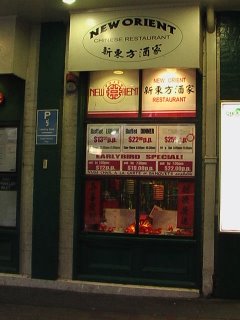
Use to be called Orient - started by Peter and Ronald Chan.
Now New Orient - Whether you've got a group of 10 or 100, New Orient is the perfect location for your Christmas and end-of-year functions! With a maximum seating capacity of 200, our friendly staff are happy to serve your every need - we have a range of options to cater to any budget and help you create an unforgettable experience:- Full, 3-course banquets (from $35 p.p.)- Christmas buffet dinners (Sun-Thur $22 p.p.)featuring a Live Band on Fri & Sat nights! ($28 p.p.)
Mid City Auckland
Friday, February 03, 2006
Leaving
Reasons for leaving China
Meanwhile, South China was beset by overpopulation, land shortages, famine, drought, banditry, and peasant revolts. A steady stream of able-bodied young men sought their fortunes overseas, first in South-East Asia and then further afield in the Pacific Rim countries. The discovery of gold in California, Canada and Australasia swelled this exodus. Rather than settling permanently in other lands, these men usually intended to make their fortunes and then return to China.
Chinese goldminers
In New Zealand, the Otago goldfields attracted the first batch of organised Chinese migrant workers. They were recruited by the Dunedin Chamber of Commerce when European miners left Otago for the newly discovered West Coast goldfields. There were particular reasons for choosing Chinese people: they were thought to be hardworking, inoffensive, and willing to rework abandoned claims, and they preferred to return eventually to their homeland. In 1866, the first 12 men arrived from Victoria, Australia. By late 1869 over 2,000 Chinese men had come to the land they would call the ‘New Gold Mountain’.
Early immigrants came from the Pearl River delta area in Guangdong province. Most (67%) were from Panyu county; the rest were from Siyi, Zengcheng, Dongguan and Zhongshan. These counties are located around the city of Canton (Guangzhou).
Although most men were married, their wives remained at home to look after the men’s parents. Chinese women seldom migrated to New Zealand and the sex ratio of the community was extremely unbalanced. For example, there were only nine women to 4,995 men in 1881 – the year that saw the highest numbers of Chinese in New Zealand prior to the Second World War.
The plight of the Chinese miners was dire. Few struck it rich, and most remained in enforced bachelorhood, poverty-stricken and stranded in a strange land.
The first immigrants
In the 19th century, New Zealand’s settlement policy aimed to create a ‘fairer Britain of the South Seas’. Chinese, or any non-white migrants, were regarded as undesirable in this nation-building enterprise.
At least one Chinese man settled in the decade after British annexation. Wong Ahpoo Hock Ting, better known as Appo Hocton (a corruption of his given name), arrived in Nelson in 1842. By 1852 he was naturalised and had established a cartage business.
But any plans for organised Chinese settlement were scuttled by 1853. Edward Gibbon Wakefield, known for his success in settling the colony with British small farmers, formulated detailed plans to bring in Chinese to provide valuable labour as servants, shepherds, stock-keepers, mechanics and manual workers. But he had to drop this idea when opponents labelled his scheme a conspiracy to overrun the colony with ‘Coolie-slaves’ who were ‘ignorant, slavish, and treacherous’.1
Thursday, February 02, 2006
Happy Birthday Sky City - Previously Harrads
Man Charged with Triad Enforcer's Murder
02.02.06 11.20am
A man has been arrested and charged with the murder of Tam Yam Ah outside a karaoke bar in Auckland in July last year. The 53 year-old unemployed Petone man was seized by police from Auckland and Wellington this morning. Mr Tam, 37, was shot in the chest as he got out of his car outside the Top City Karaoke Bar in Symonds Street in the early hours of July 7. Police revealed last year that he was a triad enforcer. Mr Tam, who was returning to his home above the bar, died at the scene. Detective Inspector Bernie Hollewand, at Auckland CIB, said the team in Wellington had been following a detailed investigation plan and this morning's arrest came as police searched for further evidence and attempted to interview three men in the area. The murder accused is one of those three. He will appear in the Lower Hutt District Court today where police will request that he be remanded in custody to appear in the Auckland District Court in about a week. - HERALD ONLINE STAFF 2-2-06

